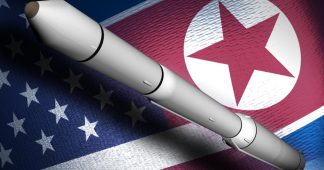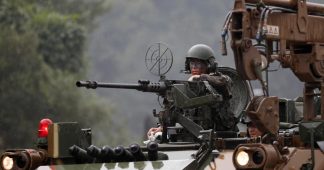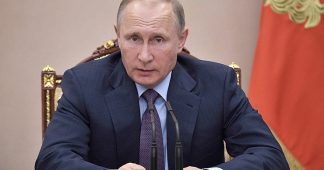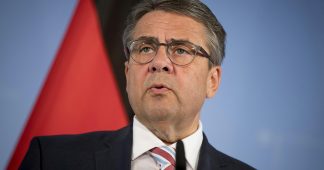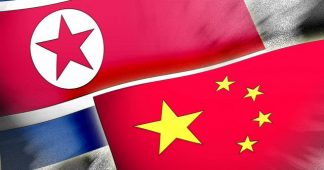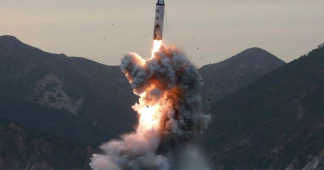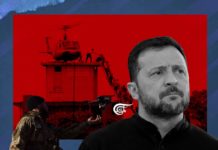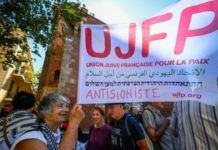The political process to resolve the North Korean crisis has reached a stalemate and such military activities by the US as the recent joint maneuvers with South Korea risk being interpreted by Pyongyang as a signal of possible aggression, renowned Russian military analyst Vasily Kashin said.
Is Dialogue Still Possible?
“The goal of the North Korean leadership was to impose direct dialogue on the United States and reach a compromise which would restrict its nuclear development, provide security guarantees from Washington and allow for the easing of sanctions. However, the current US administration is unlikely to start direct dialogue with Pyongyang,” Kashin, who is a senior research fellow with the Institute for Far Eastern Studies at the Russian Academy of Sciences, told Sputnik China.
At the same time, according to the analyst, mutual nuclear deterrence with Pyongyang would also be “unacceptable” for Washington since American officials have long portrayed North Korea as a “poor country ruled by madmen.”
“Any talks, except for the nuclear disarmament of North Korea, would mean serious reputational losses for the US,” Kashin added.
CIA Director Mike Pompeo recently warned that North Korea could obtain the capability of delivering a nuclear strike on the continental part of the US “within months.” Even taking into account the current sanctions against Pyongyang and their possible strengthening, North Korea is unlikely to curb its nuclear and missile ambitions. Pyongyang has said that it would talk to the US only after the development of a North Korean intercontinental ballistic missile (ICBM) is completed.
Kashin pointed out that Pyongyang apparently wants to maintain dialogue with Washington “from a position of strength,” adding that the current situation is a “deadlock” in which there is the risk of “reckless moves” by the US. One of the options on the table is a limited strike on North Korea to damage its nuclear and missile capabilities.
Unrealistic Option
He, however, explained that such a scenario would be short-sighted. First, there are no guarantees that such an attack would be able to inflict serious damage on the North Korean nuclear and missile program and, as a result, delay its development for several years. Second, according to the analyst, no one can guarantee that the North Korean leader will not order a retaliation strike on South Korea and Japan.
“Policymakers in Washington believe that Kim Jong-un is a rational leader, but his vision of the world is still different. From his point of view, not responding to an American strike would undermine the stability of the North Korean leadership,” the analyst said.
Kashin also noted that it is not necessarily true that the North Korean leadership regards a full-scale military conflict on the peninsula as a “suicidal move.”
Suggesting that the Iraqi scenario would not work out for North Korea, he explained why, “There are some factors, including a challenging terrain, a large number of underground fortifications, the size of its armed forces and its air-defense system, which make a hypothetical invasion of North Korea very difficult,” he said.
What About China?
Speaking with Sputnik China, Guan Zhaoyu, an analyst with the Institute for Financial Studies, at the Renmin University of China, emphasized that US-led drills near the Korean Peninsula is one of the main destabilizing factors in the current situation.
He pointed out that a “double freeze” scenario proposed by China in June and backed by Russia presumes the end of North Korea nuclear and missile tests and the simultaneous halt of US-South Korean military activities in the region.
“Washington’s drills have been interpreted by Pyongyang as a threat to its existence and resulted in an escalation in the region. … Taking into account the current situation, all parties involved should adhere to the ‘double freeze’ roadmap and the West should stop threatening a military solution to the North Korean crisis,” Guan said.
Commenting on possible actions by China in this situation, Zhao Tong, a fellow in the Carnegie Nuclear Policy Program based at the Carnegie-Tsinghua Center for Global Policy, suggested that Beijing is unlikely to support any preventive or preemptive military operations as the Chinese leadership wants to prevent an “all-out war.”
“A major war on China’s doorstep could threaten or undermine the rise of China and disrupt the national rejuvenation process led by President Xi Jinping. There is no reason for China to support any side to initiate any military conflict,” Zhao told Sputnik China.
